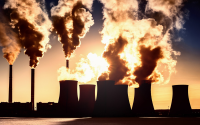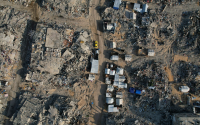Common Dreams / Published on Thursday, September 28, 2006 by the Inter Press Service Stephen Leahy
Boreal forests provide 250 billion dollars a year in ecosystem services like reducing atmospheric carbon and water filtration, but which have gone unacknowledged by governments and industry, experts say.
Governments need to begin accounting for those services before allowing timber, oil and gas and mining to carve up the world's remaining northern forests, argues the Edmonton, Canada-based ecological economist Mark Anielski. The globe-spanning boreal forest is the last great forest ecosystem -- larger even than the Amazon. The boreal is also the largest terrestrial storehouse of carbon, making it one of the world's best defences against global climate change. "The boreal is like a giant carbon bank account. The forests and peatlands store an estimated 67 billion tonnes of carbon in Canada alone -- almost eight times the amount of carbon produced worldwide in the year 2000," Anielski told IPS. Storing carbon and absorbing carbon dioxide are just one of 16 ecological services the boreal provides. "We couldn't calculate values for them all -- such as providing food and habitat for bees that perform valuable services like pollination," said the researcher, who presented his findings at Canada's 10th National Forest Congress Sept. 25-27. Other services like waste recycling and soil formation also went uncounted. "This 250-billion-dollar estimate is a very conservative number," Anielski noted. Most of the world's original wild forests have been logged or developed, and today, only about 20 percent remains, mainly in the boreal and Amazon region. Canada's portion of the boreal represents more than 1.3 billion acres -- over 25 percent of the remaining intact forest on the planet. "If these ecosystem services were counted in Canada, they would amount to roughly nine percent of GDP [Gross Domestic Product]," he said. That represents more than the GDP contribution of Canada's huge mining sector, at four percent, or its booming energy industry, at 5.6 percent. Most of the Canadian boreal is in public hands, but just eight percent is officially protected. There is growing pressure to expand industrial logging, hydropower, mining and oil and gas development in the boreal. "It is high time for everybody to realise that Canada is not an endless sea of virgin forest anymore. Almost half of the forest is either logged or fragmented," said Peter Lee, executive director of Global Forest Watch Canada, an environmental group in Edmonton, Alberta. Global Forest Watch and the World Resources Institute in Washington are part of an international effort to map and document the extent of the world's remaining forest using satellite data. Satellite pictures also clearly reveal forest cover loss through fires and logging. New satellite pictures show massive clear-cutting of the boreal forest in the province of Ontario. Despite a government commitment to sustainable forestry, photos from space show big holes in the forest cover exceeding 260 hectares in size, where nothing is left but rocks and broken tree branches. Ontario allows clear-cutting up to 750 hectares while Russia, home to the majority of the boreal, allows only 50 hectares. Concern over the Canadian boreal has grown such that a large coalition of environmental groups and industry, including some forestry companies, has joined the Canadian Boreal Framework, which calls for protection of at least 50 percent of the forest. "Canada is one of the only countries in the world that still has an opportunity to get it right, to protect our boreal forest and ensure a sustainable, conservation-based economy," said Tzeporah Berman of ForestEthics, an environmental group active in Canada, the United States and Chile. While efforts gain momentum to preserve existing Canadian forests, the U.S. could offset nearly 20 percent of its current emissions of CO2 by turning marginal farmland into forests. An estimated 115 million acres of land in the lower United States that is poor for agriculture but good for growing trees could store enough carbon to reduce the country's current emissions of 7.075 billion metric tonnes by nearly 20 percent, according to the report "Agricultural and Forestlands: U.S. Carbon Policy Strategies" released recently by the Pew Centre on Global Climate Change. "There is lots of land out there and we are tapping so very little of our ability to sequester carbon," says report co-author Ken Richards of the School of Public and Environmental Affairs at Indiana University. "It would cost about 50 dollars per metric tonne of carbon stored," Richards told IPS. Most of the 50 dollars per tonne of carbon cost is compensation for landowners. "Farmers support the idea but only if they can count on receiving money for this over the long term such as decades," he said. Many U.S. government conservation programmes either fail to get funding at all or are funded for short periods of time. There have been at least nine programmes that could have stored carbon on farms in the past few years but they never received the necessary funding, he said. This re-foresting of the United States would bring many other benefits, such as erosion control, water quality protection and improved wildlife habitat. "Over longer time horizons, agricultural and forestlands can produce biomass-based substitutes for fossil fuels, thereby further reducing emissions," the Pew report notes. It would also be good for farmers in the U.S., where agricultural overproduction has kept crop prices low for many years. "The challenge is how to make this (reforestation) happen quickly and effectively," said Richards.





